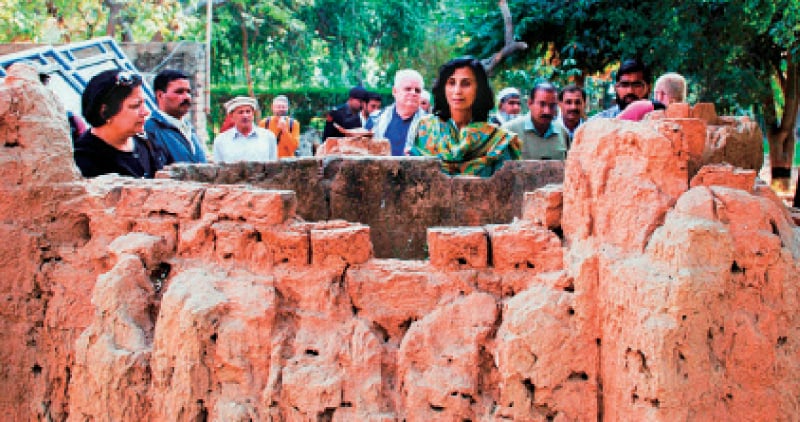
SAHIWAL: It’s first time that I am in Punjab to see one of the major Indus civilisation sites. This is fantastic. We should learn more about the lifestyle of Harappan people through technology as they are our forefathers, says Dr Marry Sophie of the University of Rannes, France, while talking to Dawn during a field trip to the archaeological site.
The trip was a part of the 2nd Harappa International Conference of the Comsats Institute of Information Technology (CIIT) that ended on Monday. Twenty local and foreign archaeologists participated in the conference.
Ms Sophie stressed more restoration work of the site as it’s a not only Pakistani site but a part of world heritage.
“The national, international and local community, especially the youth, must take ownership of the site and come forward for its further preservation,” she said.
Prof Jonathan Mark Kenoyer, renowned American expert on Indus Civilization and Harappan culture, gave a presentation on his 30-year-work and led the delegates to the archeological site.
“I have been working in Harappa since 1986 to understand this ancient site. My work gives me a good idea of traditional culture of Punjab as well as ancient foundation of this (Harappa) culture that goes back to thousands of years. The Harappan civilisation did not grow with outside influences but it was developed by local communities of ancient periods who developed it internally,” Mr Kenoyer told Dawn.
He pointed out that the uniqueness of Harappan heritage was due to the local influences with thousands of years of history.
Dr Marco Medella from University of Pompeu Fabra, Spain, said it was important to know the heritage site of the Bronze Age to understand the history of the country and its people.
Dr Zakirullah Jan, chairman Department of Archaeology, University of Peshawar, spoke highly of the gathering of international experts who shared their experiences and expert opinion on Harappa. He said lot of preservation work has been done on Taxila but Harappa somehow remained neglected. It’s high time that both federal and provincial governments focus on the site and make efforts to bring it on the World Heritage List of the United Nations Educational, Scientific and Cultural Organization (UNESCO), he said.
Dr Abdul Samad, director Peshawar Museum and Muhamad Hasan, curator Harappa Museum, also talked about their views on the conference and the archaeological site.
Earlier, the delegates visited Harappa Museum where they were received by Sports, Archaeology, and Tourism secretary Nayyar Iqbal, Sahiwal Commissioner Babar Hayat and Harappa City chairman Naveed Aslam Lodhi.
At the end, CIIT Sahiwal campus director Dr Saleem Farooq distributed souvenirs among all the delegates of the conference. The delegates will also visit the Walled City of Lahore and fort.
Published in Dawn, December 20th, 2016














































Dear visitor, the comments section is undergoing an overhaul and will return soon.